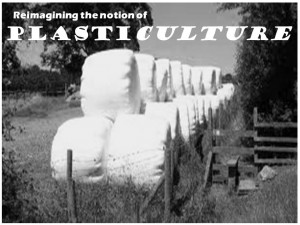Some words should just never have been invented. Plasticulture is one of those kinds of words. Apparently someone felt the need to put a name to all this plastic that is now covering soils, crops, trees, greenhouses, etc. and thus the word plasticulture was born. While it’s supposedly a word smush of plastic + agriculture, that is not the first thing that comes to mind. It sounds more like ‘plastic culture’. Culture has many different definitions, one of which relates to excellence in some area (arts, manners, etc.). Perhaps some think we’ve reached plastic nirvana but I definitely don’t count myself among them. Another meaning of culture is a ‘stage of civilization’. Sadly this one seems to make more sense. We certainly seem like we have reach a point in time where plastic is the answer to nearly everything. Plastics in agriculture was invented to solve certain problems (i.e. weed control, improved water management, prolonged shelf life, etc) yet it has introduced a whole host of new problems.
While creating a certain dependency on finite fossil fuel based materials is perhaps a tad short sighted, that is not the worst part of getting farmers hooked on plastics. The ‘assembly-line’ mentality behind the product is much more detrimental. By that I mean, once the product leaves the factory, it enters the land of ‘not my problem anymore’ (can we get some extended producer responsibility on this subject please?). Farmers use the plastic for a growing season or a winter to wrap their rolled bales of hay into giant marshmallows or cover their silage, strawberries or greenhouse or all sorts of other uses. After that is enters the land of ‘hmmm… what do I do with this mountain of plastic’. Burial or burning seem to be the most common solutions; yet one is not good for the land, the other horrendous for the air.
What if we were to reimagine the whole notion of plasticulture and displace plastic with, say, I don’t know, maybe biochar and move towards Charculture, perhaps? Before any eye rolling, let me assure you that it isn’t really that far out of a notion. Fabric made from activated carbon (AC) already exists. It’s not nearly as cheap as plastic but perhaps swapping biochar for the more expensive AC will help reduce the cost. Color-wise char fabric would be fine as a lot of plastic couture is already black. Functionally it should be able to block weeds, help retain moisture and perhaps aid in fermentation as plastic does. But the real triumph would be that the notion of disposal, especially disposals with detrimental effect, would all but disappear. Char fabric could be used for all sorts of secondary purposes once its first life is over; from enriching the soil, to building buffer zones around water bodies, to filtering waste water, not to mention all that sequestration potential…


